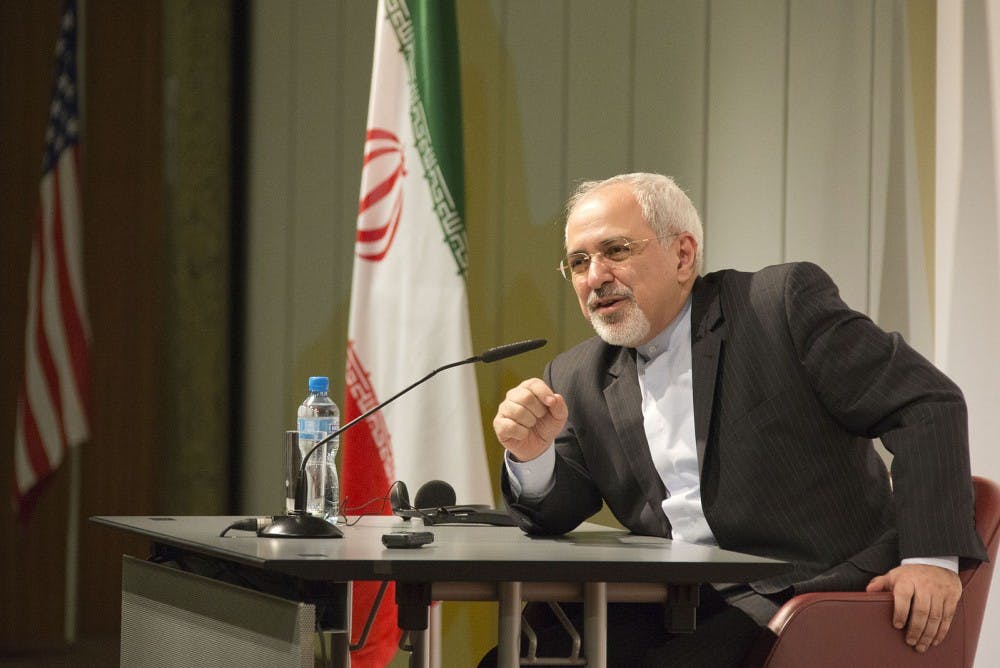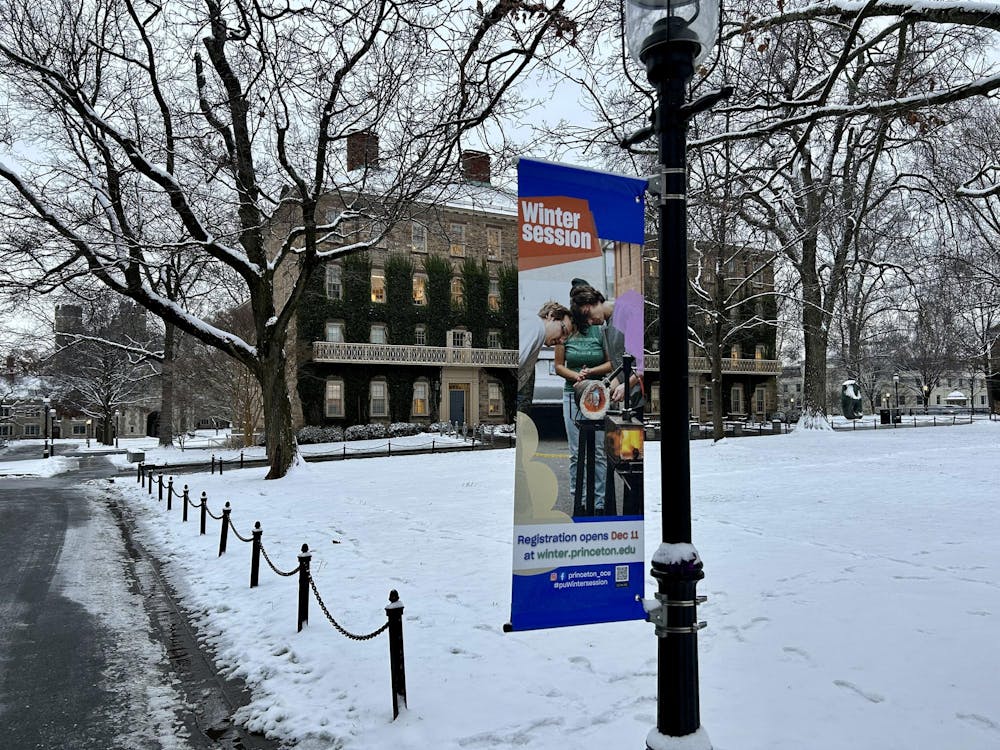In an interview with NPR published on Sept. 23, Iranian Foreign Minister Javad Zarif said that he “ha[s] made proposals” to return detained University graduate student Xiyue Wang to the United States, including a proposed prisoner exchange last September. Last month, the Trump Administration told CBS News that there are “no direct talks underway between the two countries, and they did not consider” a recent-at-the-time proposal from Zarif to swap prisoners to be serious.
Wang was in Iran studying Farsi and completing dissertation research in August of 2016 when he was arrested, convicted of espionage, and sentenced to 10 years in an Iranian prison. Most recently in June, the University renewed its “urgent call” for Wang’s release, citing a United Nations Working Group on Arbitrary Detention report which found that Iran had “no legal basis for the arrest and detention” of Wang.
Last month, a day after the three-year anniversary of Wang’s detainment, his wife, Hua Qu, held a press conference in Washington, D.C., where she “implore[d] Iran, the United States, [her] home country, China, and other members of the international community to secure the release of this innocent man, Xiyue Wang, and make our family whole again.” During this press conference, Qu called for renewed diplomatic talks between the United States and Iran.
“Morning Edition” host Steve Inskeep, who conducted the recent interview with Zarif, said he spoke with Qu prior to the interview and asked her if she had any words for the foreign minister.
“She said, ‘My husband is innocent. He’s not a spy. He’s just a student. We just want to plead for their clemency to let him go,’” Inskeep said.
In response, Zarif said that he “would love to see [Wang] go back to his family,” and that he made proposals last September that would have allowed Wang to return home. Specifically, he went on to describe the possibility of a prisoner exchange involving Wang and an Iranian professor who Zarif claimed has spent the last nine months in a U.S. prison and is being held “without charge.”
The “Free Xiyue Wang” Twitter account referred to Zarif’s willingness to exchange Wang for this Iranian professor as “huge if true,” tagging President Donald Trump, Secretary of State Mike Pompeo, and National Security Advisor Robert O’Brien, asking if they will “look into this.”
President of the Free Xiyue Wang Working Group Michael “Mikey” McGovern GS wrote in a statement to The Daily Princetonian that he thinks Wang being mentioned explicitly in the interview with Zarif is exciting. However, he said, Zarif had previously expressed that he is open to negotiations with the United States.
“As for why the U.S. hasn’t acted on it, the pretty straightforward explanation is that the President is staking his reputation on undoing the work of his predecessor,” McGovern wrote. “So, without sufficient political and civilian pressure, it will be difficult to get the U.S. to the negotiating table.”
To provide this pressure, McGovern asks “that the Princeton community get together and write letters, emails, and even tweet at Trump and their elected officials to get the U.S. to bring Xiyue Wang home.”
He added that the Working Group will be holding a rally and vigil on Oct. 3 at 5 p.m. in the East Pyne courtyard to commemorate the three-year anniversary of Wang’s detainment, which occurred during the summer of 2016.
In the NPR interview, Zarif said that he does not personally have the power to release Wang as foreign minister, but that he “can go to the court and tell them, ‘I can exchange this man for an Iranian,’ and then have … a legal standing.”

Zarif does not, at any point in the interview, mention the name of the Iranian professor involved in the hypothetical prisoner exchange. He does, however, insist on the professor’s innocence.
“He was given a visa to come to the United States. His visa was revoked while he was flying to the United States. He has not committed any crime. What should I say to the wife of this professor?” Zarif asked Inskeep.
The claim that the United States has unjustly imprisoned Iranian scientists is not a new one. In May, Iran’s Minister of Science, Research, and Technology Mansour Gholami accused the United States of “trapping Iranian scientists,” saying that “they issue visas for Iranian professors and then arrest them as soon as the professors arrive in the U.S.”
In this case, Gholami was referring to the arrest of Iranian stem cell researcher Masoud Soleimani, who was indicted behind closed doors and had his visa revoked while en route to the United States. Still in prison, Soleimani has been charged with violating trade sanctions by failing to acquire a license to export growth factors, proteins that can stimulate cellular growth, into Iran. Soleimani’s lawyers argue that no license was required and that the growth factors are exempt from export restrictions because they are used for medical purposes.
Though Zarif never names the professor involved in his prisoner-exchange proposal, he may have been referring to Soleimani’s case.
When asked whether Wang should be held hostage in Iran because of a case in the United States, Zarif replied with a question of his own: “Should the Iranian citizens be held hostage in the U.S.?”
On the merits of Wang’s conviction, Zarif stated, “Like it or not, this man was convicted,” though the United Nations Working Group on Arbitrary Detention concluded in 2018 that “there is no evidence that Mr. Wang was present in Iran for any reason other than to pursue his dissertation research” and that his detention was “arbitrary.”
After a brief moment of contention over Wang’s innocence, wherein Inskeep said Wang was “made to confess,“ Zarif claimed the Iranian professor imprisoned in the United States “is being asked to sign a plea bargain if he wants to be released.”
“So where should we be?” Zarif asked. “Should we continue to discuss this until the end of the day, or should we exchange?”
Zarif is currently in New York attending the United Nations General Assembly meeting this week. There, relatives of a number of prisoners being held in Iranian prisons, including Qu, will be demonstrating as a part of the Families Alliance Against State Hostage Taking.
This group, according to reporting from Forbes, “is calling for stronger international condemnation of Iran’s actions” and has requested to meet with either Zarif or Iranian President Hassan Rouhani.
These events come at a time of particularly high tensions between the United States and Iran, ramped up last week after the United States imposed a round of sanctions on Iran’s central bank over Iran’s alleged role in an attack on Saudi Arabian oil facilities. Officials in Saudi Arabia and the United States have implicated Iran in the attacks, though Zarif has denied that Iran played any role.
Trump, in his address to the United Nations General Assembly on Sept. 24, doubled down on his “maximum pressure” economic strategy with regards to Iran, though he did not mention military options.
“All nations have a duty to act,” Trump said. “No responsible government should subsidize Iran’s bloodlust. As long as Iran’s menacing behavior continues, sanctions will not be lifted. They will be tightened.”
Rouhani is expected to address the General Assembly on Sept. 25.








